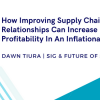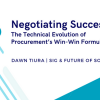One of the greatest aspects of being in the procurement world, is the relationships that we build with our peers. The industry, the geography and the maturity of the procurement organization do not stop us from forming lasting relationships that we draw on from time-to-time. Recently I was involved in a discussion with several of my peers concerning all the new technology and processes that will change our lives forever. Sometimes it reads like an eye chart at an ophthalmologist’s office…sometimes the technology is so advanced that it sends a chill down your spine. We shifted to the age-old question: are these the new innovations that will finally be our profession’s asteroid, ending procurement as we know it?
My initial inclination is that no matter what the new technology is, no matter what the new process is – procurement/supply chain management is, at its core a process about the people. We should not be afraid of new ideas and technology, but we need to get out of our own way first. Let’s embrace RPA, blockchain and automation – these things will revolutionize our profession – but lets also focus on the myriad of thoughts and ideas that are really putting the profession behind.
We all know the power of procurement and supply chain rests in the hands of those who can transition the team from a gatekeeper of processes to an integral team within our organizations. By eliminating the following phrases, we can transform procurement and perceptions which have hindered our profession for far too long.
“We need your requirements for the RFP”
Our team conducted a Request for Proposal for a professional service that was utilized across the enterprise. There was a cross-functional team that met for weeks to determine all the requirements needed for the RFP. Procurement “led” this initiative by collecting all the requirements and inserting them into an RFP template. The RFP was over 75 pages long and had hundreds of questions.
A second team was in the process of purchasing a commoditized product for a capital project at our campus. This was a product that could have easily been bought off a specification sheet. However, this team didn’t ask for requirements and had zero questions for the suppliers. Simply, they asked for a solution. The only requirement was – bring us a solution.
If Procurement wants to be a trusted advisor or partner to our businesses, we should understand what it is that they need. Do they need a transcription service or do they need a solution? The latter procurement process was delivered in half the time and created a promoter of our process within the business.
“It’s strategic”
A CEO of a company that I worked for outlawed the word “strategic.” If you had a proposal or recommendation that used that term, watch out. In his eyes, using the term “strategic” meant that you did not have data or sound reasoning to back up your recommendation. It may be a little extreme, but his point is well taken – we are a profession of data and sound decisions. Now I will argue that some items are very difficult to quantify, but let’s just say that and not fall back on a buzzword.
“I must be the single point of contact with the supplier”
I have heard this across several of our teams. As part of a tactic to negotiate, I understand the mindset. Unfortunately, I think we take hold of a responsibility and fail to use the talent across the different areas of the organization. Our company has leaders that love to negotiate…we also have some on the other end of the spectrum. Why not use the strengths of the team to create an optimal process? Negotiations are both an art and a science, and this quote from Bill Belichick summarizes that concept well, “On a team, it’s not the strength of the individual players, but it is the strength of the unit and how they all function together.” Our process allows flexibility in the team roles and responsibilities for that very reason. We are all aligned on the outcomes and goals, but the path to get there is varied.
“That is not my job”
We have a great view of many interactions and initiatives within our organizations, another reason why our profession is a great place to learn a business. However, we can get hung up in the traditional roles and responsibilities within our companies. Too often, we push back on activities because they are undefined, broken or risky. Because we have visibility to many areas in the organization, I think too often we wait to be invited or worse, wait in the background and do not volunteer to be part of the solution. Supply Chain Management has evolved over the last twenty years from a focus on logistics and transportation, to procurement and strategic sourcing, to now even including service and data. If the forerunners of supply chain would have said “that’s not my job” 20 years ago, we would not be discussing blockchain and RPA today.
Procurement, as a profession, is not dying…it’s just evolving. As risks and opportunities change in the future, we should have the mindset to evolve as well. It’s time to embrace the change and let go of the problematic ideals. Let’s not be the dinosaurs looking at an asteroid passing through the sky, let’s grab hold and create the evolution to a great profession.









